
The Memorial Healthcare System
Serving South Florida...
and beyond!

The Memorial Healthcare System
Serving South Florida...
and beyond!
Memorial Healthcare System, the fifth-largest public health care system in the country, consists of Memorial Regional Hospital, Memorial Regional Hospital South, Joe DiMaggio Children's Hospital, Memorial Hospital West, Memorial Hospital Miramar, Memorial Hospital Pembroke, Memorial Primary Care Centers, and numerous ancillary facilities.
On January 23, 2008, the Memorial Healthcare System took a significant step toward its vision of being a world-class model of safety, quality, service, and efficiency when its Board of Commissioners adopted a new Mission Statement:
The Memorial Healthcare System provides safe, quality, cost-effective, patient- and family- centered care regardless of one's ability to pay, with the goal of improving the health of the community it serves.
The Patient- and Family-Centered Care model is based on the belief that health care can be improved by building more effective partnerships among health care providers, patients, and families. Memorial's philosophy of care statement includes:
Memorial's administrators believe that patient- and family-centered care is critical to achieve optimal results and enhance the safety of patients and the quality of the health care they receive. They also know that this can only be accomplished by treating patients and their families as partners on the care team. Every decision is based on the best interests of patients and their families-equal partners in health care.
Each MHS hospital offers unrestricted family presence to meet the needs of patients and their families, as well as significant support for the culturally diverse population served by the system. Signage and patient information materials are in English, Spanish, and Creole and special services for patients with special needs include support for service animals and pet therapy.
Fundamental to the MHS journey toward patient- and family-centered care are the System's Patient and Family Advisory Councils. As of 2009, MHS has eleven advisory councils that meet regularly, involving some 80 advisors. Advisory Councils across the Healthcare System are engaged, involved, and contributing effectively to system-wide efforts toward patient- and family-centered care. They provide the patient/family perspective on a wide variety of enhancement and improvement initiatives, ranging from how to involve patients and their families in patient safety, designing brochures for families in ICU settings, improving satisfaction with care, and how families can help staff work with flexible visiting hours.
The System is committed to finding new ways to collaborate and new areas of improvement to address. Members of the Councils serve on a variety of standing committees (quality, safety, performance improvement teams) as well as acting as faculty for new employee orientation and other staff development programs. They attend the System's quarterly Leadership Development sessions, and each major leadership meeting includes a patient or family "story." Family members of patients help teach new employees and existing staff by "telling their stories" in person or on video, describing their health care experiences in ways that help support and improve patient- and family-centered care practices. Family and patient faculty serve on panels at internal and external conferences, and have made presentations at the Institute for Patient- and Family-Centered Care's International Conferences.
Memorial Regional Hospital (MRH) is one of Florida's largest hospitals and the flagship facility of Memorial Healthcare System. It is one of only seven Level I trauma centers in the state of Florida, and its Emergency Department - the busiest in highly-urbanized Broward County -- is nationally recognized as a "Best Practice" site. The hospital's Sickle Cell Day Program is one of only a few such programs in the nation.
Memorial Regional has an active Patient and Family Advisory Council, which provides insights and perspectives on a wide range of issues, policies, and patient-related communications brought to the Council by staff seeking the Council's input. At a recent meeting, Council members engaged in a lively discussion about the layperson's understanding of Advance Directives; their advice helped shape workshops for the Senior Partners community education program. They are currently discussing how to better deliver "just in time" information and education to inpatients and their families.
Memorial Regional Hospital PFAC members serve on committees to:
Memorial Regional Advisors launched the System's first Patient and Family Resource Center in 2008, the success of which subsequently spread to the other System facilities. The Center provides helpful health-related information, hospitality services, community information, and support for families of patients in making connections within the hospital. Staffed by specially-trained volunteers 7 days a week, the Center provides patients and their families access to a photocopier, a fax machine, a printer and three computer work stations where they can bookmark health information websites, and keep family and friends up-to-date about patients' conditions while at the hospital.
The Memorial Regional Advisors have now turned their considerable energies to a new long-term project to develop affordable emergency lodging options for out-of-area families of patients, a particularly important need in this major tourist region.
Memorial Cancer Institute-located at Memorial Regional Hospital and Memorial Hospital West-has its own Patient and Family Advisory Council, comprised of patients and family members who are knowledgeable about Memorial Cancer Institute and are collaborating to improve services. Meeting monthly to review policies, procedures, and practices, Council members educated themselves on insurance and billing processes and provided input into these issues. They publish a newsletter that includes practical and supportive information for patients and families dealing with cancer. They have also made recommendations for patient information and forms, and contributed their ideas and perceptions to the design of the Bone Marrow Transplant and Breast Cancer Center facilities.
Memorial Hospital West opened in 1992 to meet the diverse health care needs of the rapidly growing community of Pembroke Pines. It is home to one of the busiest adult Emergency Departments in Broward County and a separate, children's Emergency Department. In addition, Memorial Hospital West has an Intensive Care Unit with a Level II Neonatal Intensive Care Unit, a Family Birthplace, The Lactation Center, and a Fitness & Rehabilitation Center. In 2007, Memorial Hospital West earned one of the highest levels of recognition a hospital can achieve-Magnet Designation for its excellence in nursing services, awarded by the American Nurses Credentialing Center.
The Family Advisory Council at Memorial Hospital West plays an important role. Council members provided testimonials for the magnet status process. They reviewed patient discharge folders and consulted on the patient discharge process, reviewed the Patient & Visitors Guide and safety information flyers; and consulted on the plans for a new bed tower and the Breast Cancer Recovery Center, as well as the Patient and Family Resource Center.
Memorial Regional Hospital South offers a wide array of services, including geriatric care, inpatient rehabilitation; a sleep disorders clinic, an Emergency Department, and a designated hospice unit. With its special focus on geriatric care, Memorial Regional Hospital South is dedicated to providing a full continuum of care for patients and their families.
MRH-South Advisory Council members enthusiastically provided advice for the Patient and Family Resource Center; how it should be furnished, and what it should contain to meet the needs of patients' family members. Wireless access, comfortable seating, task lighting, reading materials, and even pizza delivery menus were great suggestions! Table and computer desks are at two different heights for varied users and wheelchair and walker access into and around the room have been considered as furnishings were obtained and placed. The Children's Corner offers games, books, a television and movie videos to help keep little ones occupied while parents are using the room. As a result, the room reflects what patients and family members need and want in an on-site refuge.
In 2009, MRHS will become the health care system's site for inpatient rehabilitation programs and services, and home to the MHS Spine Center. These services are being designed with the input of the Patient-Family Advisory Council.
Memorial Hospital Miramar is a full-service, acute-care hospital that offers a wide range of medical and surgical services, an Adult Emergency Department, as well as a separate Children's Emergency Department that is affiliated with Joe DiMaggio Children's Hospital.
Located in a rapidly growing area of young families, Memorial Miramar was built from the ground up on patient- and family-centered care principles. The Hospital's Family Birthplace is a specially designed maternity unit that features private suites with many amenities for patients and their families. A multi-disciplinary team of doctors, nurses, respiratory therapists, and parents planned and designed the Neonatal Intensive Care Unit. Each NICU room is private; parents can spend the night and immunized siblings can spend time with their baby brother or sister.
Family and friends can share in the joy of a new baby - even if they are miles apart - through the Online Nursery, where new parents can safely post online photos of their babies. To ensure privacy and security, parents are issued a personal identity code that they can share with family and friends to view photos.
Council members participate on safety and quality committees, and have given input into projects for the Level II Neonatal Intensive Care Unit, Patient Discharge Folders, Patient Communication Boards, the Patient-Family Resource Center, redesign of the sleeper/sofas and the development of the automated Medication Reconciliation Discharge Report.
Memorial Primary Care Centers provide a wide scope of medical services for the uninsured and underinsured adults and children who reside in South Broward County. In 2008, Primary Healthcare Services accounted for nearly 105,000 patient visits.
A Patient and Family Advisory Council serves all three Primary Care Centers. One of its first projects was to collaborate with staff on the redesign of the Clinic Pharmacy, with the goal of simplifying the process and making it more patient-friendly. Providing valuable feedback on pharmacy processes, as well as the physical layout, Council members recommended combining processes that traditionally required stops in two different locations into a single site within the renovated pharmacy, thus significantly reducing confusion and wait times. They also recommended replacing the glass service windows with an open-counter design, to remove a barrier and enable the patients to have eye-to-eye with the pharmacy technicians.
Recently, a group of patients and family members helped to design a four- month workshop to learn more about Diabetes and become more involved in their own health care. The Diabetic Dinner Club is now successfully helping patients to manage their disease.
Primary Care Center Advisors sit on the Primary Care Patient Satisfaction Committee, and provide feedback to the System administrators about the specialty care the patients receive through Primary Care. They are involved in everything from selecting wall colors for the Clinic to providing feedback about proposed Clinic systems changes. Recently they attended a Broward County Transit meeting to express the need to continue the public bus route that serves the main Primary Care Center, Memorial Regional Hospital South, and Memorial Regional Hospital. Their efforts were successful and the route was not eliminated.
Across the Memorial Healthcare System, the participation of patients and family members on Advisory Councils is very important to enhancing the quality of the health care experience. Patients and families collaborate with health care professionals to tackle issues that are easier to see from "the other side of the bed." They identify things that are more important to patients and families than health care professionals may have realized. And they are an important part of helping to continually improve health care services and design programs and services that meet real health care needs as patients and families define them.
Patient and Family Advisors are an integral part of the mission of the Memorial Healthcare System, and they are truly "partners in care."
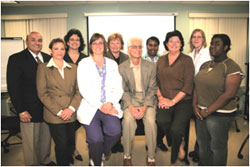 Memorial Cancer Institute Advisors
Memorial Cancer Institute Advisors
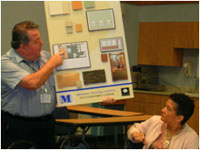 The MRH Resource Center planned by Advisory Council
The MRH Resource Center planned by Advisory Council
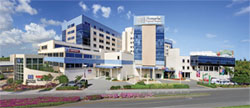 Memorial Regional Hospital
Memorial Regional Hospital
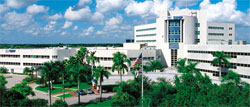 Memorial Hospital West
Memorial Hospital West
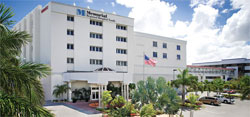 Memorial Regional Hospital South
Memorial Regional Hospital South
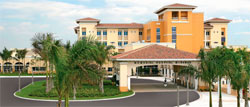 Memorial Hospital Miramar
Memorial Hospital Miramar
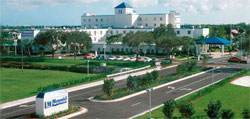 Memorial Hospital Pembroke
Memorial Hospital Pembroke
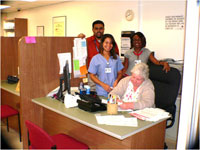 Primary Care Center Advisors collaborated to redesign clinic layout
Primary Care Center Advisors collaborated to redesign clinic layout